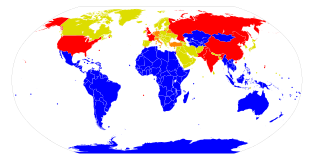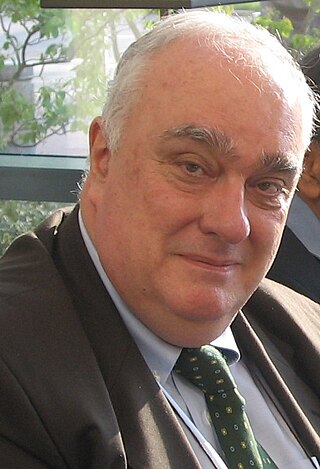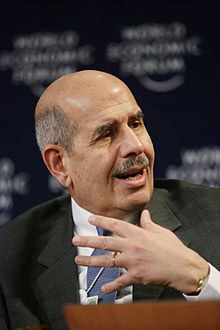
The International Atomic Energy Agency (IAEA) is an intergovernmental organization that seeks to promote the peaceful use of nuclear energy and to inhibit its use for any military purpose, including nuclear weapons. It was established in 1957 as an autonomous organization within the United Nations system; though governed by its own founding treaty, the organization reports to both the General Assembly and the Security Council of the United Nations, and is headquartered at the UN Office at Vienna, Austria.

The Treaty on the Non-Proliferation of Nuclear Weapons, commonly known as the Non-Proliferation Treaty or NPT, is an international treaty whose objective is to prevent the spread of nuclear weapons and weapons technology, to promote cooperation in the peaceful uses of nuclear energy, and to further the goal of achieving nuclear disarmament and general and complete disarmament. Between 1965 and 1968, the treaty was negotiated by the Eighteen Nation Committee on Disarmament, a United Nations-sponsored organization based in Geneva, Switzerland.

Nuclear disarmament is the act of reducing or eliminating nuclear weapons. Its end state can also be a nuclear-weapons-free world, in which nuclear weapons are completely eliminated. The term denuclearization is also used to describe the process leading to complete nuclear disarmament.

Hans Martin Blix is a Swedish diplomat and politician for the Liberal People's Party. He was Swedish Minister for Foreign Affairs (1978–1979) and later became the head of the International Atomic Energy Agency. As such, Blix was the first Western representative to inspect the consequences of the Chernobyl disaster in the Soviet Union on site, and led the agency response to them. Blix was also the head of the United Nations Monitoring, Verification and Inspection Commission from March 2000 to June 2003, when he was succeeded by Dimitris Perrikos. In 2002, the commission began searching Iraq for weapons of mass destruction, ultimately finding none. On 17 March 2003, U.S. President George W. Bush delivered an address from the White House announcing that within 48 hours, the United States would invade Iraq unless Saddam Hussein would leave. Bush then ordered all of the weapons inspectors, including Blix's team, to leave Iraq so that America and its allies could invade Iraq on 20 March. In February 2010, Blix became head of the United Arab Emirates' advisory board for its nuclear power program. He is the former president of the World Federation of United Nations Associations.

Mohamed Mostafa ElBaradei is an Egyptian law scholar and diplomat who served as the vice president of Egypt on an interim basis from 14 July 2013 until his resignation on 14 August 2013.

The Pugwash Conferences on Science and World Affairs is an international organization that brings together scholars and public figures to work toward reducing the danger of armed conflict and to seek solutions to global security threats. It was founded in 1957 by Joseph Rotblat and Bertrand Russell in Pugwash, Nova Scotia, Canada, following the release of the Russell–Einstein Manifesto in 1955.

Iran is not known to currently possess weapons of mass destruction (WMD) and has signed treaties repudiating the possession of WMDs including the Biological Weapons Convention, the Chemical Weapons Convention, and the Non-Proliferation Treaty (NPT). Iran has first-hand knowledge of WMD effects—over 100,000 Iranian troops and civilians were victims of chemical weapons during the 1980s Iran–Iraq War.
A nuclear fuel bank is reserve of low enriched uranium (LEU) for countries that need a backup source of LEU to fuel their nuclear reactors. Countries that do have enrichment technology would donate enriched fuel to a "bank", from which countries not possessing enrichment technology would obtain fuel for their power reactors.

United Nations Security Council Resolution 1696, adopted on July 31, 2006, after expressing concern at the intentions of the nuclear programme of Iran, the Council demanded that Iran halt its uranium enrichment programme.
This is the timeline of the nuclear program of Iran.

The International Campaign to Abolish Nuclear Weapons is a global civil society coalition working to promote adherence to and full implementation of the Treaty on the Prohibition of Nuclear Weapons. The campaign helped bring about this treaty. ICAN was launched in 2007. In 2022 it counted 652 partner organizations in 107 countries.

The UN Office for Disarmament Affairs (UNODA) is an Office of the United Nations Secretariat established in January 1998 as the Department for Disarmament Affairs, part of United Nations Secretary-General Kofi Annan's plan to reform the UN as presented in his report to the General Assembly in July 1997.
The International Conference on Nuclear Disarmament took place in Oslo on 26 and 27 February 2008. It was organized by The Government of Norway, the Norwegian Radiation Protection Authority in collaboration with the NTI and the Hoover Institute. The Conference, entitled "Achieving the Vision of a World Free of Nuclear Weapons", had the purpose of building consensus between nuclear weapon states and non-nuclear weapon states and about the importance of all the actions in the NPT.

Yukiya Amano was a Japanese diplomat and the Director General of the International Atomic Energy Agency (IAEA). Amano previously served as an international civil servant for the United Nations and its subdivisions.
The International Luxembourg Forum on Preventing Nuclear Catastrophe — is an international non-governmental organisation uniting leading world-renowned experts on non-proliferation of nuclear weapons, materials and delivery vehicles.

United Nations Security Council Resolution 1887, adopted unanimously on 24 September 2009, the Council addressed non-proliferation and the prevention of the spread of weapons of mass destruction in the world.
The 2010 Review Conference for the Treaty on the Non-Proliferation of Nuclear Weapons (NPT) was held at United Nations Headquarters in New York City from 3 to 28 May 2010. The President of the Review Conference is Ambassador Libran N. Cabactulan of the Philippines. UN Secretary-General Ban Ki-moon used the opening of the conference to note that "sixty five years later, the world still lives under the nuclear shadow".

Paolo Cotta-Ramusino has been Secretary General of Pugwash Conferences on Science and World Affairs since August 2002. He is also Professor of Mathematical Physics at the University of Milan (Italy) and Senior Researcher at the Italian National Institute of Nuclear Physics. Cotta-Ramusino is an adjunct Professor, Centre of International Politics, Organization and Disarmament, School of International Studies, Jawaharlal Nehru University, New Delhi and an Associate with the Project on Managing the Atom, Belfer Center for Science and International Affairs, John F. Kennedy School of Government, Harvard University. He is a member of the International Institute for Strategic Studies, and the World Academy of Art and Sciences.

The International Day against Nuclear Tests is observed on August 29. It was established on December 2, 2009, at the 64th session of the United Nations General Assembly by the resolution 64/35, which was adopted unanimously.

The 2017 Nobel Peace Prize was awarded to the International Campaign to Abolish Nuclear Weapons (ICAN) "for its work to draw attention to the catastrophic humanitarian consequences of any use of nuclear weapons and for its ground-breaking efforts to achieve a treaty-based prohibition on such weapons," according to the Norwegian Nobel Committee announcement on October 6, 2017. The award announcement acknowledged the fact that "the world's nine nuclear-armed powers and their allies" neither signed nor supported the treaty-based prohibition known as the Treaty on the Prohibition of Nuclear Weapons or nuclear ban treaty, yet in an interview Committee Chair Berit Reiss-Andersen told reporters that the award was intended to give "encouragement to all players in the field" to disarm. The award was hailed by civil society as well as governmental and intergovernmental representatives who support the nuclear ban treaty, but drew criticism from those opposed. At the Nobel Peace Prize award ceremony held in Oslo City Hall on December 10, 2017, Setsuko Thurlow, an 85-year-old woman Who survived the 1945 atomic bombing of Hiroshima, and ICAN Executive Director Beatrice Fihn jointly received a medal and diploma of the award on behalf of ICAN and delivered the Nobel lecture.















